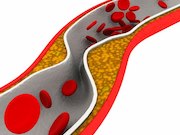Most patients experience increase of at least 3.7-fold in plasma PCSK9 levels after treatment
TUESDAY, Nov. 28, 2017 (HealthDay News) — Plasma levels of proprotein convertase subtilisin/kexin type 9 (PCSK9) may help assess apparent resistance to PCSK9 inhibitors, according to a research letter published online Nov. 28 in the Annals of Internal Medicine.
Michael D. Shapiro, D.O., from the Oregon Health & Science University in Portland, and colleagues describe changes in plasma PCSK9 levels before and after PCSK9 inhibitor therapy in 17 adult patients with cardiovascular disease (14 patients) and/or familial hypercholesterolemia (nine patients). Before and three months after initiation of PCSK9 inhibitor therapy, total plasma PCSK9 levels were measured.
The researchers found that the mean baseline plasma PCSK9 level was 324 ng/mL. Within five days of their sixth self-injection, the total plasma PCSK9 levels were 2,286 ng/mL in patients with the anticipated greater-than-45-percent reduction in low-density lipoprotein cholesterol (LDL) levels (median seven-fold increase from baseline levels). Plasma PCSK9 levels varied, but they increased by at least 3.7-fold in 16 of the patients; pre- and post-treatment values were not overlapping for any of these patients. Two of the patients with familial hypercholesterolemia had markedly attenuated response of LDL cholesterol levels to the PCSK9 inhibitor; one of these patients had no change in plasma PCSK9 levels.
“We report a simple method for assessing apparent resistance by measuring total levels of plasma PCSK9 before and after treatment,” the authors write.
Several authors disclosed ties to the pharmaceutical industry.
Copyright © 2017 HealthDay. All rights reserved.








